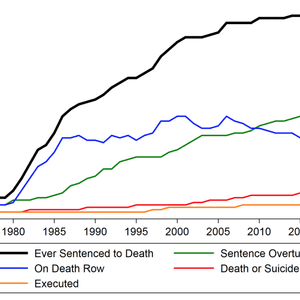In an article entitled The Death Penalty: No Evidence for Deterrence, John Donnohue and Justin Wolfers examined recent statistical studies that claimed to show a deterrent effect from the death penalty. The authors conclude that the estimates claiming that the death penalty saves numerous lives “are simply not credible.” In fact, the authors state that using the same data and proper methodology could lead to the exact opposite conclusion: that is, that the death penalty actually increases the number of murders. The authors state: “We show that with the most minor tweaking of the [research] instruments, one can get estimates ranging from 429 lives saved per execution to 86 lives lost. These numbers are outside the bounds of credibility.”
The authors conclude that the evidence of deterrence is far too weak to rely on as a justification for the death penalty:
The view that the death penalty deters is still the product of belief, not evidence. The reason for this is simple: over the past half century the U.S. has not experimented enough with capital punishment policy to permit strong conclusions. Even complex econometrics cannot sidestep this basic fact. The data are simply too noisy, and the conclusions from any study are too fragile. On balance, the evidence suggests that the death penalty may increase the murder rate although it remains possible that the death penalty may decrease it. If capital punishment does decrease the murder rate, any decrease is likely small.
John Donohue is a professor at Yale Law School and a Research Associate at the National Bureau of Economic Research. Justin Wolfers is a professor at the Wharton School of Business and a Research Affiliate at the National Bureau of Economic Research. (The Economists’ Voice, April 2006). Read the article. See Deterrence and Studies.
Deterrence
Jan 24, 2022

Citing ‘Christian Values,’ Papua New Guinea Abolishes the Death Penalty
Studies
Jan 13, 2022

